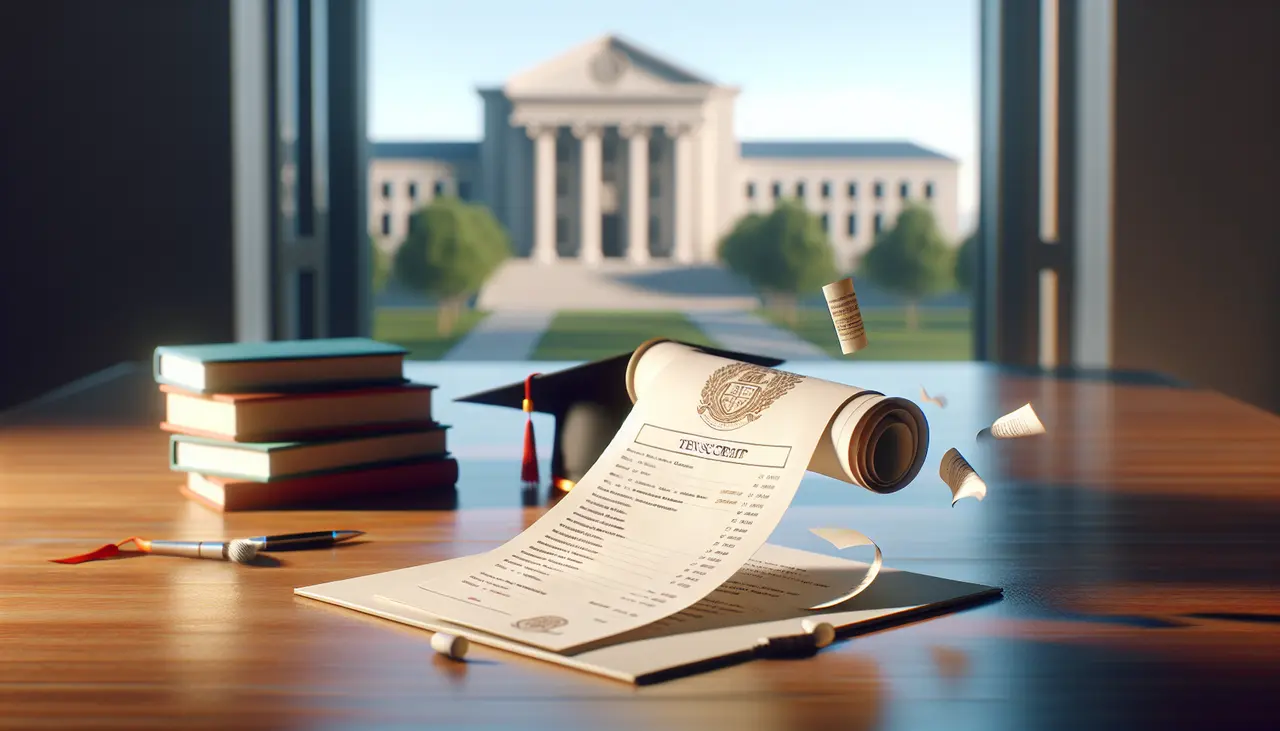Introduction: Understanding Your Position After Dropping Out
Dropping out might feel like hitting a wall at full speed – all your plans seem to crash and burn. But here’s the thing, it’s not the end of the road, especially when it comes to getting your university transcript. Many think that once you’re out, you’re out for good. Nope. Universities understand life happens. Whether it’s financial strain, personal issues, or just realizing the path you’re on isn’t right for you, dropping out doesn’t blacklist you from accessing your academic records. These documents are yours. You’ve worked for them, sat through lectures, and probably downed more coffee than you’d care to admit. Your university transcript – a record of your grades and courses – remains a part of your academic history, dropout or not. Getting your hands on it can be crucial for job applications, further education, or even just for your own records. So, take a deep breath. You’re not in a checkmate situation. Let’s walk through how you can navigate this territory.
Need help with your University Transcript? Contact Us Now!
The Importance of a University Transcript
A university transcript is not just a piece of paper; it’s a passport to your future. Whether you dropped out or are considering going back to school, understand this: a transcript is critical. It records every class you’ve taken and the grades you earned. Why does this matter? For starters, if you want to resume your studies, colleges need to know your academic history to decide where you fit in. Job hunting? Many employers ask for your transcript to gauge your skills and knowledge. Thinking of transferring to another university? Without a transcript, it’s almost impossible. It shows your potential and proves your academic achievements. Don’t underestimate its power.
Who to Contact First about Your Transcript
When you’ve dropped out but need your university transcript, start with the registrar’s office. Every university has one, and it’s their job to handle your academic records. You simply need to reach out to them, usually by visiting their website and finding the contact information. If you’re not sure where to start, a quick internet search for “[Your University Name] registrar office” will point you in the right direction. Sometimes, you can request your transcript online through their website, but other times you might need to call or email them. Remember, be clear about what you’re asking for – specify that you need your transcript and any particular details like the years you attended. They’re the first step in getting your hands on that important document, so don’t hesitate to contact them right away.
Read more: Navigating the Process of Obtaining Delhi University Transcripts for Overseas Education
Steps to Request Your Transcript Despite Not Graduating
If you left university before graduating and think getting your transcript is a no-go, think again. It’s doable, and here’s how. First up, contact the registrar’s office. This is your starting point. They hold the keys to your academic records. When you call or email, be clear you’re a former student and you need your transcript. They’ll guide you on their process. Next, fill out any required forms. Most times, they’ll ask you to complete a request form. It’s straightforward – just your basic details and what you’re asking for. Some schools might do this online, making it even easier. Then, be ready to pay a fee. Yes, getting your transcript usually comes with a cost. It’s not usually much, but it depends on the school. Ask the registrar’s office about the fee so it doesn’t surprise you. Lastly, check how you’ll receive your transcript. Some schools might mail it directly to you or whoever you’re sending it to, while others might give you a digital version. Make sure you know what you’re getting and how. And there you have it. Just because you didn’t finish doesn’t mean your academic efforts are locked away. Follow these steps, and you’ll have your transcript in hand before you know it.
Dealing with Potential Roadblocks and Academic Holds
When trying to get your university transcript after leaving school, you might hit some snags. First off, universities can put holds on transcripts for reasons like unpaid fees or library fines. Yes, even an overdue library book can stand between you and your transcript. The key here is to clear up any debts or issues with the university. Sometimes, it’s as simple as paying off a small fine, but other times, you might need to talk to the financial or academic offices for a plan. Remember, universities play by strict rules when it comes to releasing official documents. If you’ve got an academic hold, like being on academic probation, you might need to show some improvement or commitment to solving the issue. This could mean retaking a course or getting involved in academic counseling. The bottom line? Keep communication open with your university, tackle any issues head-on, and you’ll find a way to get your transcript, even if it feels like a bit of a maze to navigate through.
Tips for Communicating with University Administrators
When reaching out to university administrators for your transcript after dropping out, keep it straightforward. First, explain your situation clearly. Whether you left for personal reasons, financial hurdles, or you’re planning to return to studies later, give them the context. They need to understand your position to help you effectively. Secondly, always ask nicely. Politeness can go a long way in getting the support you need. These administrators deal with numerous requests daily, and a respectful tone can make your request stand out. Third, be patient but persistent. Sometimes, it might take a while before your request is processed. If you don’t hear back after a reasonable period, it’s okay to follow up. Just remember, stay courteous in your follow-ups. Lastly, make sure you provide all necessary information from the get-go. This includes your full name used during your studies, student ID number, the years you attended, and what exactly you’re requesting. The clearer you are, the easier it is for them to assist you.
Gathering Necessary Documentation for Your Request
Before you start the process of getting your transcript after dropping out, you’ll need to gather some basic paperwork. First, find your student ID number; it’s key for identifying your records quickly. Next, pull together any IDs that prove who you are—think driver’s license or passport. Some universities might also ask for a signed request form or a letter stating why you need the transcript, so be ready to provide that. Lastly, check if you owe any fees or fines to the university. Unsettled accounts could delay or block your request. Getting these documents in order isn’t just busy work; it ensures the university can process your transcript without hiccups.
Understanding Fees and Processing Times
Universities charge for transcript requests. It’s a standard move. The fee varies, often between (5 and 25). Some places might charge more, especially if you’re in a hurry and need that transcript fast. Rush processing can push the cost up, sometimes significantly. As for how long it takes, under normal conditions, expect to wait about a week. But if you opt for rush service, you might get your transcript in a day or two. Just remember, faster service equals higher fees. Your school’s policies and how busy they are play a big role in both the cost and the wait time. So, check with your university to know exactly what to expect.
Read more: Unlocking Canadian Dreams: A Guide to Transcripts for WES
What to Do If Your Request Is Denied
If your request for your transcript gets denied, don’t sweat it. It’s not the end of the road. First thing, figure out why. Sometimes, it’s as simple as unpaid fees you forgot about. Maybe there’s a library book gathering dust under your bed. Clear those dues, and you’re often good to go. If it’s not about money, maybe you’ve got some academic forms left unchecked. Touch base with the registrar’s office; they’re the ones who hold the keys to your dilemma. Have a chat, fill out whatever’s missing, and send your request again. Remember, persistence is key. If you hit a wall, seek advice. Academic advisors or even student legal services can offer a new angle or help you navigate the paperwork maze. Keep pushing, and don’t be afraid to ask for help when you need it.
Conclusion: Moving Forward with Your Academic and Career Goals
Dropping out doesn’t put a full stop on your academic or career journey. It’s more of a comma, a brief pause where you reflect and figure out your next move. Grabbing your university transcript is a proactive step in this direction. It’s concrete evidence of your academic history, showcasing courses taken and grades earned, and it’s essential for employers or if you plan to head back to school. Remember, your path doesn’t end here. With your transcript in hand, you’re well-equipped to pursue further education or dive into the workforce. It proves you’ve gained valuable knowledge and skills, regardless of not finishing your degree. So, use it as a stepping stone to reach your goals, exploring new opportunities with confidence. Your future is wide open; it’s up to you to take the next step.
Need more help with your transcript or other documentation needs? Reach out to us at World Document Services by calling 6232670879, or visit our website at World Document Services. Let us take the hassle out of your documentation processes so you can focus on what’s next in your academic or professional journey. Here’s to your success!
















 Call Us
Call Us Mail Us
Mail Us WhatsApp
WhatsApp
